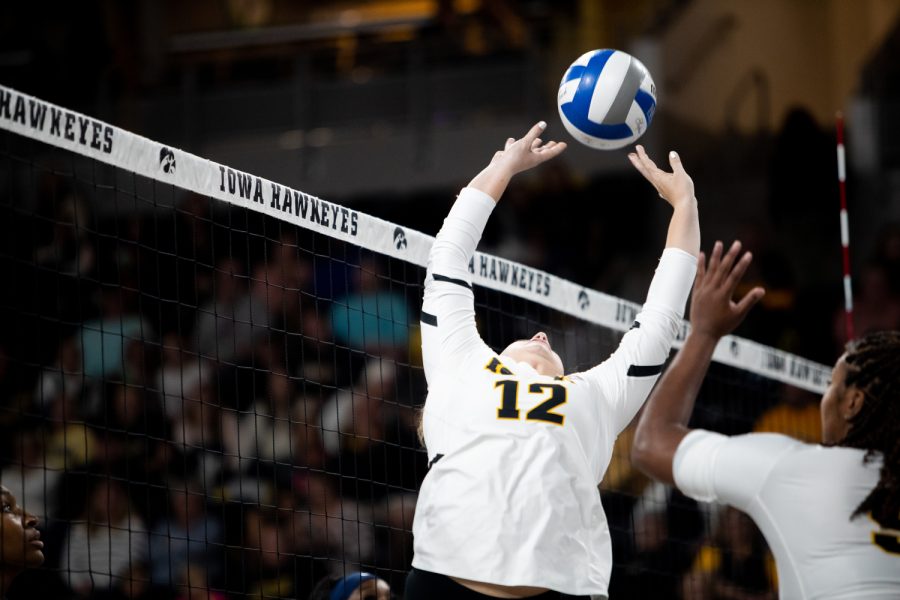NCAA volleyball might look different this season.
The NCAA Playing Rules Oversight Panel approved allowing double contacts, a rule change that has sparked debate across the country.
More specifically, this rule change “allows women’s volleyball players to contact the ball more than once with any part of the body in a single attempt on a team’s second contact when the ball is played to a teammate.”
Committee members thought the elimination of this judgment call would “bring more consistency to the game … and promote the continuation of play, which would make the game more entertaining for the players and fans.”
This mainly affects setters, who previously had to set the ball cleanly, making both hands touch the ball at the exact same time so it has little to no spin while in the air.
Some believe this change discredits the years of work setters have put in to perfect their technique and avoid double contacts. One user on X, formerly known as Twitter, said the rule change “will only promote sloppy play. The setting position is an art form. This now opens this position up for just anybody to play.”
For the Iowa volleyball team, this rule change hasn’t been a big talking point. Head coach Jim Barnes said it won’t change the way he or the rest of the staff train the athletes, emphasizing players should still try and cleanly set. Barnes said this rule means the NCAA is “catching up” with the international and Olympic level.
“Basically, they won’t call balls just because it’s got some spin to it. So now you don’t disrupt the game, and you don’t have the refs making critical plays,” Barnes said. “You want the players to make those critical plays. I go back to when we set the ball, it couldn’t spin at all. So I should be the first to be offended by it because I spent my whole life learning how to do it. And I’m like, ‘Oh, thank God that we don’t call it’ because it would be so random when they would call it, and there’s no advantage. It’s usually a worse set.”
Iowa setter Claire Ammeraal, who recently transferred from Central Michigan, said the rule “kind of” takes away from the setting position, but she is glad she can be more aggressive with her hands and not have to “worry about hitting [the ball] weird.”
Emily Lavin, a libero and designated setter for the Hawkeyes, also isn’t a big fan of the new rule but is excited to see how the game changes when the rule is added this spring and fall. Iowa will open its spring schedule with an exhibition against Drake on March 23.
Iowa’s Gabby Deery, who considers herself a pin hitter, said she won’t be as worried now if an opportunity comes where she has to set the ball.
Along with approving double contacts, the NCAA announced five other rule changes, including allowing two different liberos to play in the same set. Previously, if a libero was struggling, the coach couldn’t sub them out. Now, teams are allowed to swap out setters after every point based on who’s better on offense or defense.
The NCAA said the rationale behind this rule change was to “allow more players the opportunity to compete.”
This is similar to what Barnes said, as he thinks this rule was implemented more for the lower-level divisions where teams want to get more players on the roster. Barnes said switching out setters after every point “would be an abomination” but admitted he “would do anything” to help the Hawkeyes win.
Ammeraal said subbing in and out after every point may mess with a libero’s head, but she thinks it’s good to have it as an option.
“I’m not personally a fan because I feel like if you’re a libero you should be able to play defense, pass — you’re supposed to be the best all around,” Lavin said.
Other rule changes
- Allowing the referee to issue an administrative sanction (red card) to the home team in instances where spectators encroach the playing area and the host administration fails to resolve the problem.
- Allowing interference above the net (whether an opponent was touched) to be added to the list of plays that can be challenged in video review.
- Expanding the jewelry rule to allow small, snug-fitting nose rings and ear cuffs.
- Requiring all protests to be resolved during the match.



